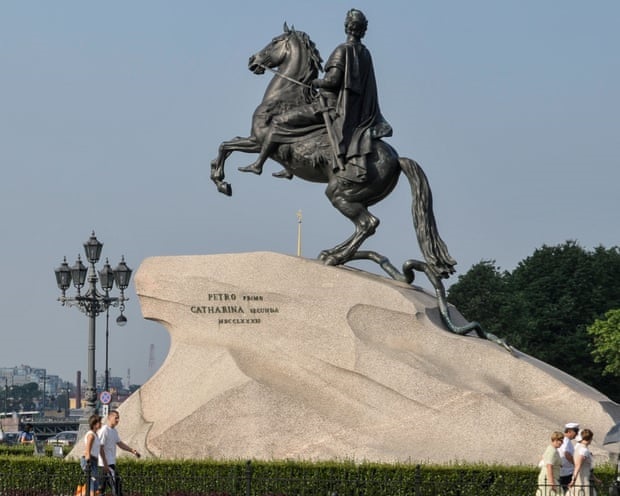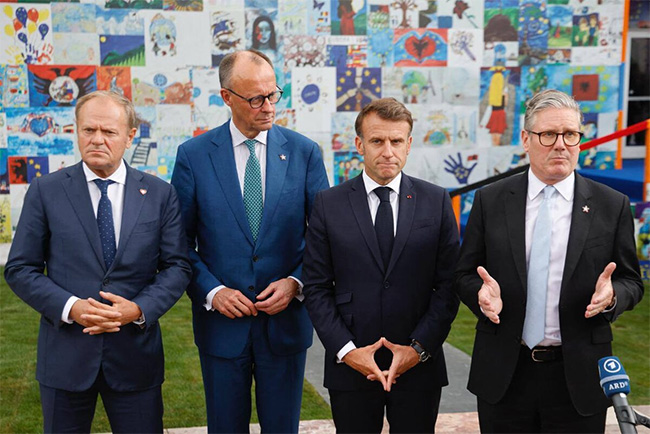 Mounted statue of Peter the Great in St Petersburg.
Mounted statue of Peter the Great in St Petersburg.
Russian peace negotiator in Istanbul invokes Peter the Great’s 21-year struggle to defeat Sweden.
Photo: ‘The Guardian’
Peter the Great’s long war against Sweden – a grinding conflict that claimed countless Russian lives – is rarely held up as a model for modern diplomacy. Yet behind closed doors on Friday, during the first direct peace talks with Ukraine in three years, Russia’s lead negotiator, Vladimir Medinsky, cited it as an explicit warning: Moscow was prepared to fight for as long as it took, writes ‘The Guardian’.
“We don’t want war, but we are ready to fight for a year, two, three – as long as it takes. We fought with Sweden for 21 years. How long are you ready to fight?” Medinsky is said to have told his Ukrainian counterparts, many of them dressed in military fatigues, inside the Dolmabahçe Palace, a grand residence on the European shore of the Bosphorus.
Vladimir Putin made apparent on Friday that his core demands remain unchanged since the war began: Kyiv must cede territory, including giving up land it currently holds, drastically reduce its armed forces, and guarantee it will never join Nato or host western troops on its soil.
It was little surprise when Medinsky, a historian, reached for rogue historical analogies to justify the invasion. Nor would it be the first time Putin has cast himself in the image of Peter the Great.
In the summer of 2022, Putin drew a parallel between what he portrayed as their twin historic quests to win back Russian lands. “Peter the Great waged the great northern war for 21 years. It would seem that he was at war with Sweden, he took something from them. He did not take anything from them, he returned [what was Russia’s],” Putin said while visiting an exhibition dedicated to the tsar.
“Apparently, it is also our lot to return [what is Russia’s] and strengthen [the country.]
The highly anticipated talks in Istanbul on Friday lasted less than two hours. Ukraine’s central demand for a ceasefire went unmet. The only concrete outcome was an agreement for both sides to exchange 1,000 prisoners of war.
Russia’s message was clear: give in now, or we will come back for more later.
Margarita Simonyan, the founder of the state-controlled news organisation RT, claimed the Russian delegation had warned Ukraine that if it refused to settle now, Moscow would no longer limit its demands to the four occupied regions and Crimea.
“Next time it will be eight [regions],” she wrote.
Putin’s confidence is fuelled by Russia’s slow but steady gains on the battlefield, Europe’s faltering response, and a domestic economy increasingly geared for a long war.
Instead of criticising Russia for sending a low-level delegation to Turkey and stalling the talks, Trump praised his “good relationship” with Putin in an interview with Fox News late on Friday, insisting the Russian leader was “at the table” – despite Putin choosing not to attend.
Ukraine will cling to Trump’s pledge on Friday to impose sanctions on Russia if no deal is reached. But analysts warn that sanctions alone are unlikely to shift the Kremlin’s course.
While Kyiv walked away largely empty-handed, the biggest blow arguably fell on Europe’s so-called coalition of the willing, led by the UK, France, Poland and Germany.
 Four European leaders in a location that resembles a kindergarten. Just their politics level…
Four European leaders in a location that resembles a kindergarten. Just their politics level…
Photo: Reuters
The week opened with four European leaders in Kyiv, standing shoulder to shoulder with Zelenskyy as they delivered a message to Putin: agree to a ceasefire now, or face coordinated pressure from Europe and Trump – including sanctions and other punitive steps.
By the end of the week, there was no ceasefire and no sanctions. In a characteristically vague response, they pledged to “align our actions” going forward.
Speaking to a Russian state reporter after the Istanbul talks, Medinsky declared Russia had no intention of stopping its assault on Ukraine
“As Napoleon said, as a rule, war and negotiations are always conducted at the same time,” Medinsky said.
Unsurprisingly, the quote appears to have been made up.
read more in our Telegram-channel https://t.me/The_International_Affairs

 11:38 19.05.2025 •
11:38 19.05.2025 •






















